With a decade in learning, memory, and decision-making behind me, as well as 20 years in the marketing industry, I’m often working on a multitude of interesting projects. That’s what you’ll find here.
Wondering what I’m currently working on? AI detection of cognitive errors, how humans interact with ChatGPT, Autism Disease, quality of life surveys, and survey methodology, as well as my usual work and school projects. (In reverse chronological order.)
The Effects of Competition on Improvisers’ Motivation, Stress, and Creative Performance: A Reaction Paper
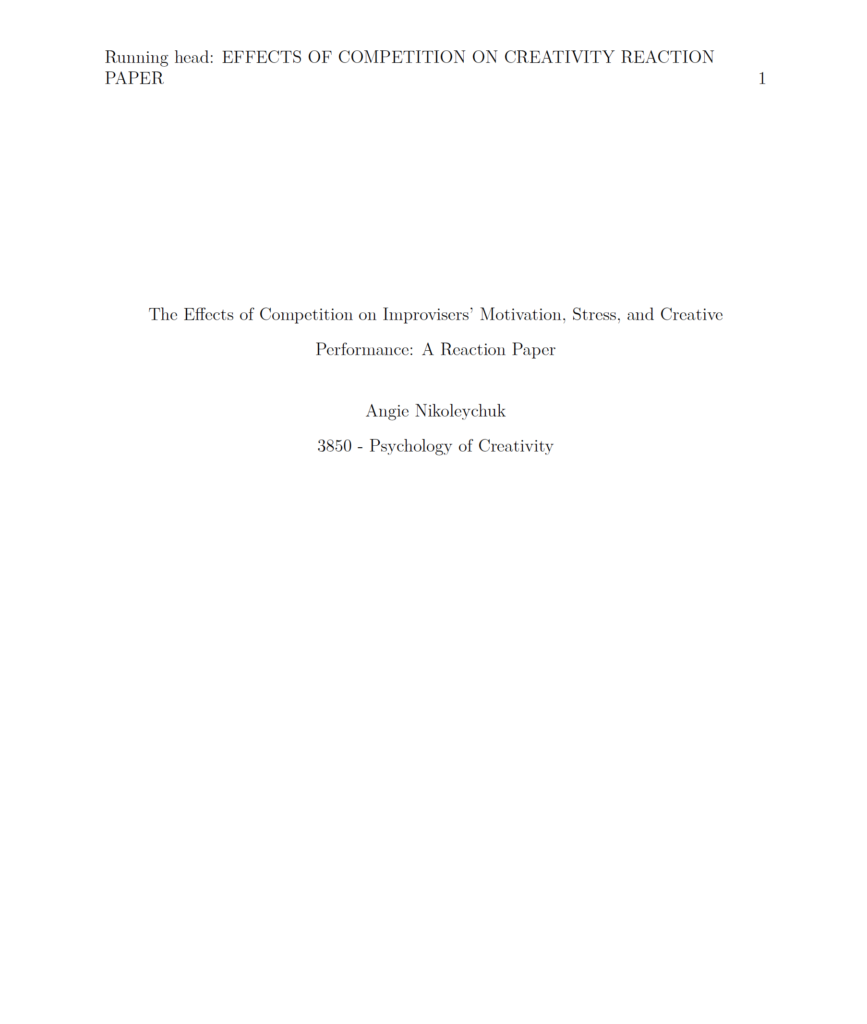
How do stress, motivations, and competition affect creativity? Completed as a partial fulfillment of PSYC 3850 – Psychology of Creativity, I summarized and shared my thoughts on The Effects of Competition on Improvisers’ Motivation, Stress, and Creative Performance (Eisenberg & Thompson, 2011).
Find the Document:
Direct download: PDF
Purpose:
3850 PSYC – Psychology of Creativity
Topics:
- Music improvisation and creativity
- Effects of audiences
- Learning and the unwritten rules in music
- Motivations behind music performance
Quality of Life Assessments, Autistic Populations & Methodology: A Better Quality of Life Is Only an Illusion
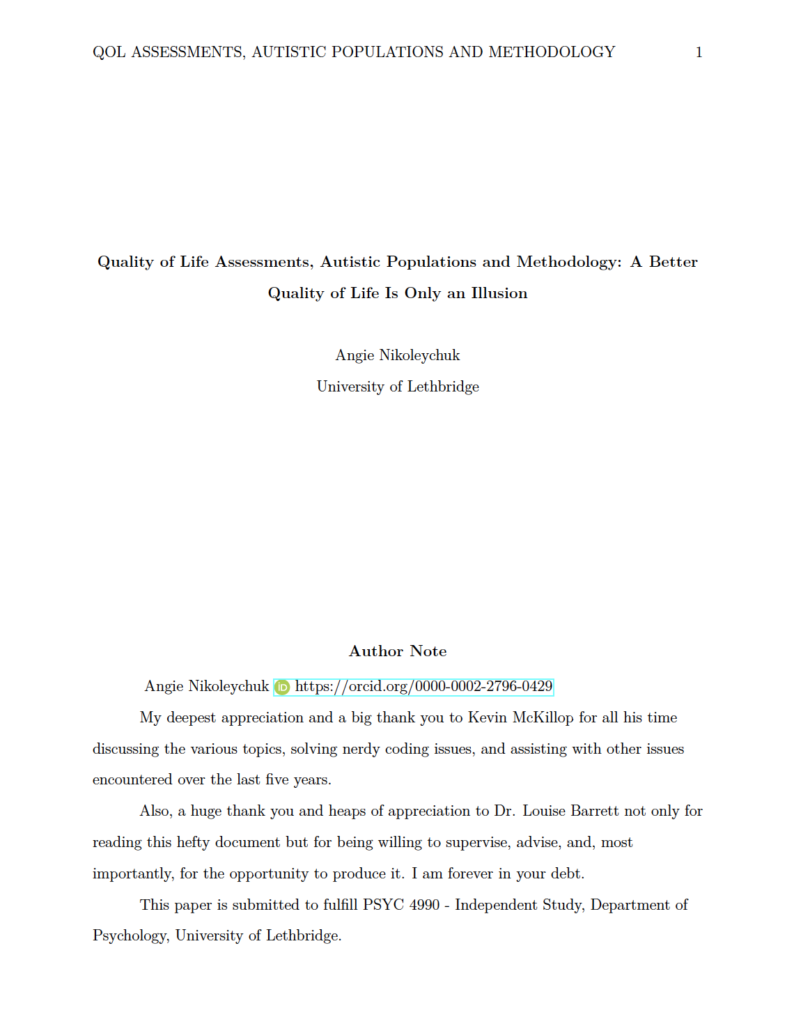
Researchers want to improve quality of life with their many studies, treatments, and care models, but what if the improvements they “find” in the lives of others are merely an illusion?
Quality-of-life questionnaires seem pretty simple, but look a little deeper at the methodology behind these tools, and you soon realize something isn’t quite right.
This paper explores the many errors, biases, and confounding variables that affect decision-making, judgements, perceptions, and the many other aspects these assessment tools rely on. It also lays the groundwork for future research projects.
Find the Document:
Direct download: PDF
Purpose:
4990 PSYC – Exploring Quality of Life in a Psychological Context
Topics:
- Decision-Making
- Judgements
- Quality of Life
- Surveys & Survey Design
- Psychometrics
- Research Methodology
Are Dollars Driving Degrees in the United States?
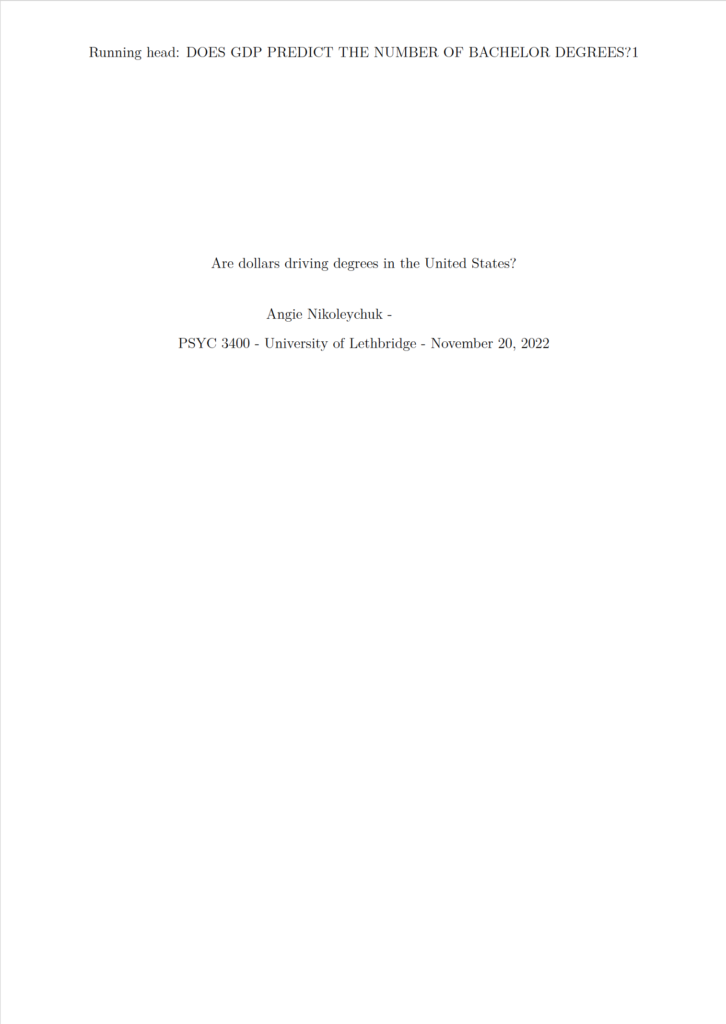
To demonstrate my understanding of data analysis, Bayesian models, and R/Python to complete my advanced psychology statistics course, I chose to examine if GDP of a state influenced the number of bachelor’s degrees earned, and whether public and private school attendance influenced post-secondary attendance to demonstrate working with confounding variables and data.
Find the Document:
Direct download: PDF
Purpose:
PSYC 3400 – Methods, Statistics, & Models
Topics:
- R/Python
- Bayesian Modeling
- Data analysis and statistics
Synopsis of “Preserved Neural Correlates of Priming in Old Age and Dementia” by Cindy Lustig and Randy L. Buckner (2004)
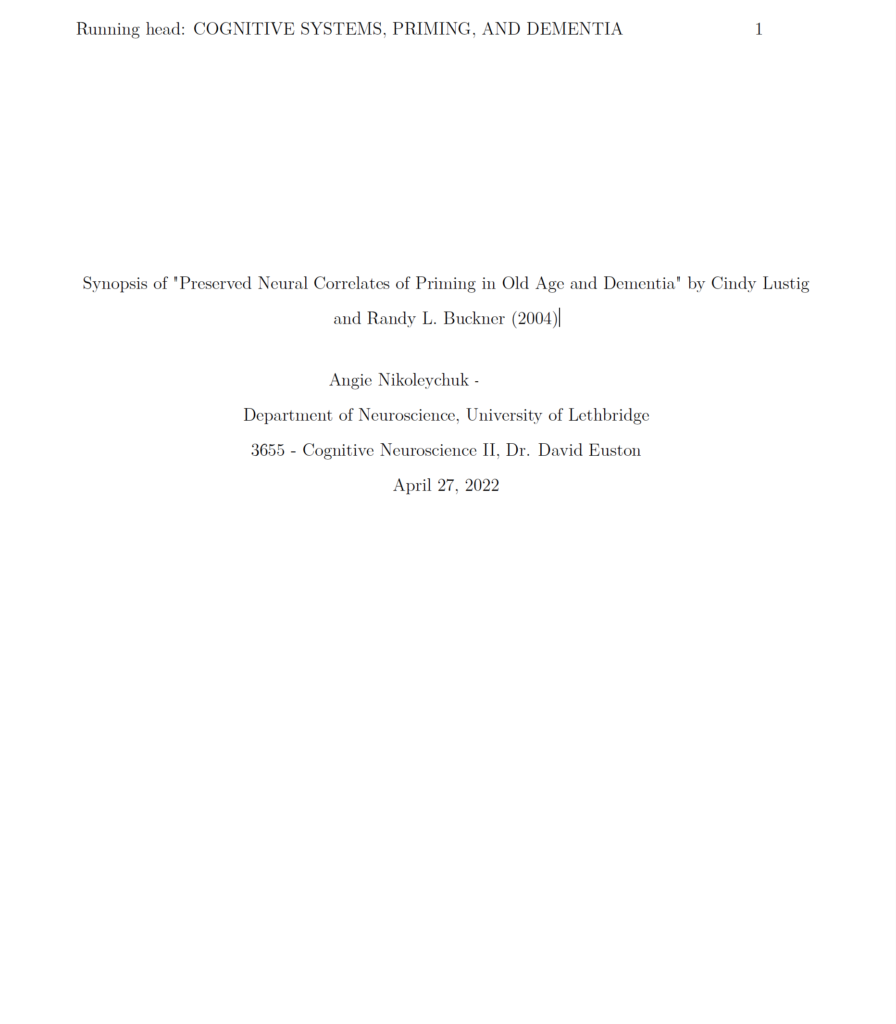
The most devastating aspect of Alzheimer’s disease and other forms of dementia is the tell-tale destruction of explicit memory. Despite that, implicit memory may be a viable loophole for treatment. Lustig and Buckner’s 2004 paper, Preserved Neural Correlates of Priming in Old Age and Dementia, is one of the most important papers examining this possibility.
Lustig and Buckner found implicit priming remains even in dementia subjects with significant explicit decline. Increased activation in Broadmann’s 45/47 and 6/44 along the left frontal gyrus, suggesting older adults compensate with visual processing areas and bilateral recruitment.
These findings suggest that implicit therapeutic and care methods could be viable options for older individuals with dementia.
Find the Document:
Direct download: PDF
Purpose:
3655 – Cognitive Neuroscience II
Topics:
- Priming
- Implicit memory
- Neural correlates of priming
The Gap Rebrand: Why It Failed & How To Move Forward
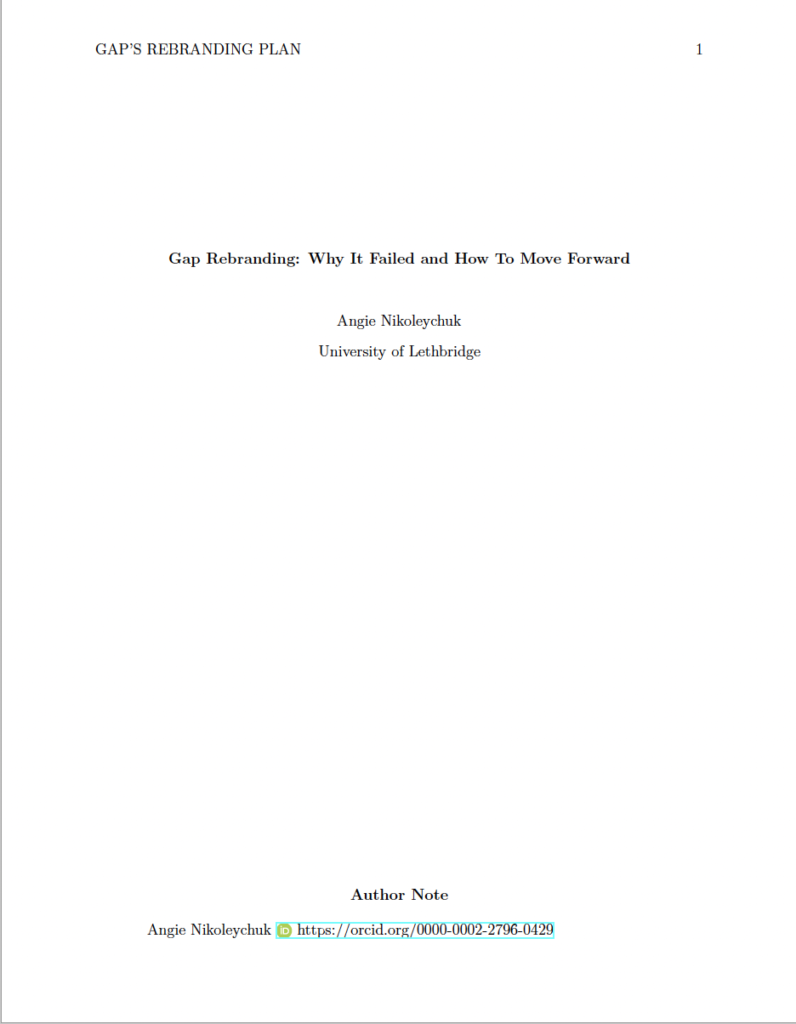
The Gap clothing brand failed spectacularly when it attempted to launch a new logo in 2010 and bring its iconic logo into the modern day. Why? Poor research, a horrible design choice, and even poorer communication.
Unfortunately, this experience makes future rebranding attempts significantly more difficult. Here, I explore why the rebrand failed and suggest how they can do it right next time using foundational principles of marketing and psychology.
Find the Document:
Direct download: PDF
Purpose:
3850 PSYC – Consumer Psychology
Topics:
- Brand image
- Customer communication
- Design & perception
- Crisis management
- Organizational decision making
Cognitive Disabilities, Technological Flexibility, and The NIH Toolbox – Cognitive Battery: A Literature Review
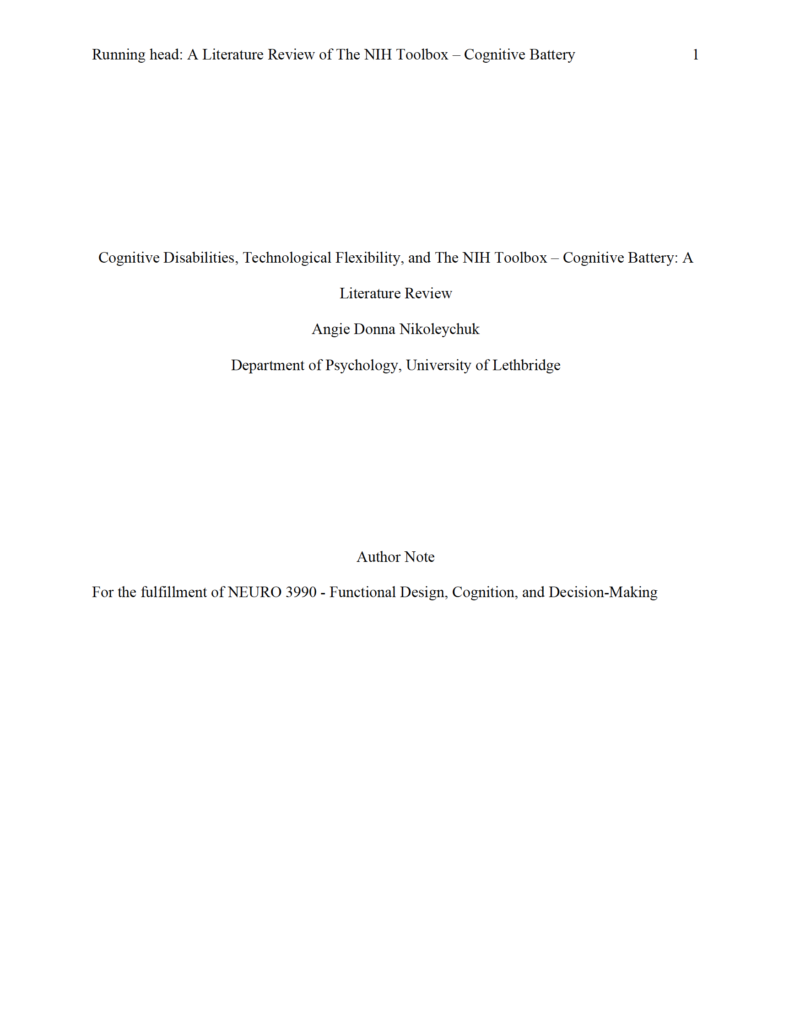
The National Institute of Health Toolbox – Cognitive Battery was designed to provide researchers and professionals with an effective, accurate, low-cost method of assessing various aspects of cognitive function and cognitive processes. While its validity is generally acceptable and above, it is not accurate enough in certain circumstances to be used as a sole measurement.
Some of these inaccuracies and lack of validity and reliability may also be partly due to shortfalls in the devices or design. This literature review examines the current body of research and identifies areas that could benefit from further study.
Find the Document:
Direct download: PDF
Purpose:
3990 NEUR – Functional Design, Cognition, and Decision Making
Topics:
- Neuroscience
- Usability
- Software Design
- Cognitive Assessment
